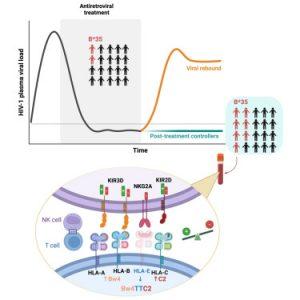In a new study, researchers have identified specific immunogenetic traits linked to long-term control of HIV in people who stop antiretroviral therapy (Figure 1). These individuals, known as “post-treatment controllers,” offer a model for sustained HIV remission—and possibly, a functional cure.
The findings may pave the way for new immunotherapies targeting natural killer (NK) cells, offering hope for durable HIV control without lifelong treatment.
Key Findings
- Post-treatment controllers can suppress HIV viral load without ongoing therapy—some for over 25 years.
- The research focused on participants from the VISCONTI cohort, a landmark group of early-treated individuals.
- Investigators found genetic markers associated with enhanced NK cell function were highly enriched in these individuals.
- These NK cell traits were confirmed in over 1,600 participants from the ANRS CO6 PRIMO cohort, followed since early infection.
NK cells are part of the body’s innate immune system—they act quickly to kill infected cells without needing prior sensitization. In post-treatment controllers:
- Specific NK cell populations exhibit greater capacity to suppress HIV.
- These enhanced NK functions are genetically programmed, providing natural antiviral resilience.
- Their presence is especially beneficial in individuals who begin treatment very early, during the acute phase of infection.
Parallel lab work is decoding how these NK genes shape cellular behavior, with hopes of designing immunotherapies that replicate this natural control in other patients.
This discovery highlights the potential for HIV remission without daily drugs and comes at a time when global access to antiretroviral therapy is facing pressure. This work offers a roadmap to immune-driven HIV remission, moving the field one step closer to a functional cure.
Journal article: Essat, A., et al. 2025. A genetic fingerprint associated with durable HIV remission after interruption of antiretroviral treatment: ANRS VISCONTI/PRIMO. Med.
Summary by Stefan Botha











